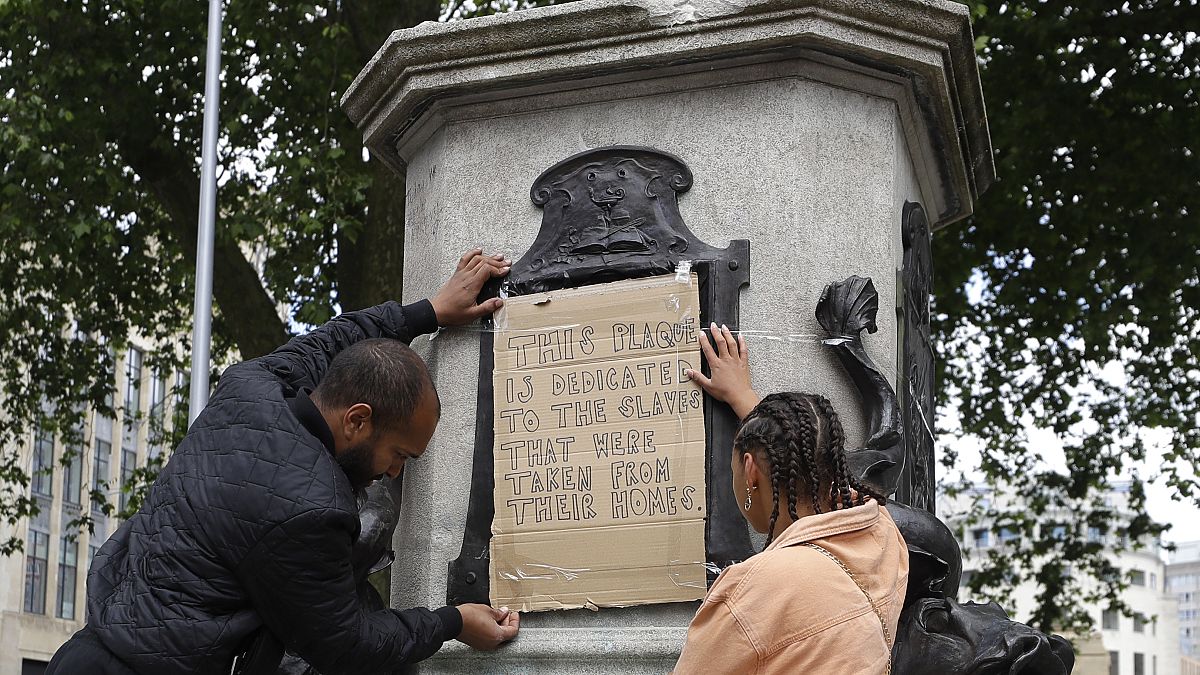'The ghost of the past, the colonial past, is still haunting these spaces,' said one historian, speaking of the controversial statues under attack in parts of Europe.
One was torn down and thrown in a river. Another set alight. Many more daubed in graffiti.
Statues are under attack, and the debate over monuments to controversial figures of the past has been thrust into the limelight in the fallout from the death of George Floyd and the impassioned protest movement it spawned across the world.
And while defenders of statues dedicated to slave traders and colonists argue you cannot “erase history”, authorities appear to be starting to listen to the protesters that say they are an everyday reminder of racism and subjugation.
In the widespread racial justice protests that have spread from Minneapolis in the US where George Floyd died, activists have been targeting statues and monuments. In the English city of Bristol, a statue of slave trader Edward Colston was toppled by a crowd and thrown into the river - a symbolic act according to Bristol’s mayor Marvin Rees.
“That is almost a piece of historical poetry, where a man who undoubtedly had slaves thrown off his ships during the passage at some point, ended up underwater,” he said.
Tower Hamlets Council in London voluntarily removed a statue of slave trader Robert Milligan. Meanwhile, a huge protest recently descended on Oxford University, with demands that a statue of imperialist Cecil Rhodes be removed. The ‘Rhodes Must Fall’ campaign is not new - but in the wake of the George Floyd protests, the debate over celebrating figures from the colonial past is being heard loud and clear, dominating news headlines in the UK and beyond.
‘The ghost of the colonial past haunts these spaces’
In Belgium, the debate has centred on King Leopold II, whose statues adorn cities across the country. For activists, they are a symbol of the country’s brutal colonial past. One statue was removed by the authorities in Antwerp, after being defaced by protesters.
Politician Wouter Vermeersch, from Vlaams Belang, told Euronews the statues are a “part of the history of Belgium” and that “we are not people who want to tear down statues, change street names, or erase cultural heritage.”
Historian and author Ana Lucia Araujo disagrees with this sentiment: “They are about memory, they are about the particular moments when the monuments were created, usually to sustain, to support a particular agenda of a particular group.
“The ghost of the past, the colonial past, is still haunting these spaces,” she says.
In the US, a statue of Confederate General Williams Carter Wickham was toppled on Saturday in Virginia. Another statue in Virginia came down on Tuesday and ended up in a lake - Christopher Columbus that time. In the same area, state officials have been planning the removal of a huge monument dedicated to Confederate general Robert E Lee. It has already been heavily defaced by protesters.
London Mayor Sadiq Khan wrote on Tuesday: “It’s a sad truth that much of our wealth was derived from the slave trade - but this does not have to be celebrated in our public spaces.”
Activists don’t see statues as the end goal of course. For Emma-Lee Amponsah, a co-founder of the Belgian-Dutch organisation Black Speaks Back, Leopold II needs to go because his statues are “a symbol of the colonial past”.
“They represent who should be perceived as a hero, who is in charge of the collective memories of the past... this is the most tangible thing that people can contest. That’s why we are talking about his statues.”
